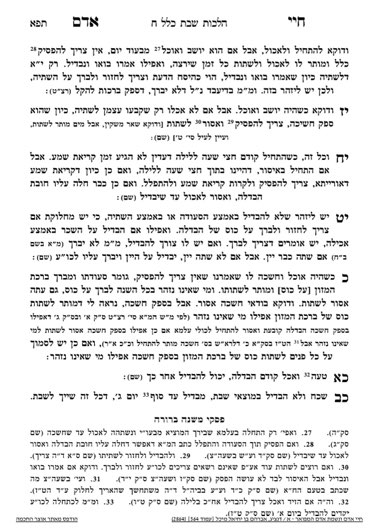We are continuing in siman 18. We have been learning about the issur of eating within a half hour of tzais. The Chayei Adam writes that if one begins their seudah more than a half hour before tzais, there is no issue with continuing to eat into the half hour of tzais. However, if one began within the half hour of tzais, since kriyas shema is a mitzvah deoraysa, they must stop their meal, wait until tzais, recite kriyas shema and maariv, and then may return to their meal.
Furthermore, once they are chayav to interrupt their meal, we no longer consider the person in the middle of their meal. Therefore, the chiyuv havdalah also takes effect, and they cannot eat until they make havdalah.
Interestingly enough, since a person had intent to return to their meal, they would not require a new bracha rishona, unless they effected a hesech hadaas.
This halacha can be applicable on Friday Night, when, by the time one gets home from Shul and is ready to begin their meal, it can be within a half hour of tzais. There is an argument which some rely on, which is that since one davened maariv and recited kriyas shema during bain hashmashos, it is possible they were yotzei. Since this issur of starting a meal within a half hour is an issur derabanan, one can rely on the fact that they have possibly already fulfilled their chiyuv kriyas shema and begin their meal. Either way, the Mishnah Berurah writes that once it is certainly night, one should not rely on this heter. In other words, one can rely on this heter in terms of starting their meal within a half hour of tzais, but one cannot rely on it in terms of starting a meal once it is certainly tzais.
There is also an opinion that if one has a minhag to always recite all three paragraphs of shema before going to sleep, and they do not just do it for protection (the primary purpose of reciting shema before going to sleep) but also to fulfill their chiyuv kriyas shema, the Taz writes that one can rely on the fact they always recite kriyas shema and begin their meal without reciting shema. Others disagree, soone should not rely on the Taz, unless one has a minhag to rely on the Taz.
In siman 19, the Chayei Adam discusses one who interrupts their meal to recite havdalah. Since we do not generally do so, we will skip it.
Summary
- One cannot begin a meal within 30 minutes of when they will be obligated in a mitzvah.
- If they began seudah shlishis within 30 minutes of tzais, they would have to stop, wait to daven maariv, kriyas shema and havdalah, and then return to their meal. They would not require new brachos rishonos, provided they did not effect a hesech hadaas.
- Friday night, one should say Shma before starting the meal, as it is within 30 minutes of tzais, or even after tzais.
- One possible heter is if one already recited kriyas shema during bain hashmashos, they could begin a meal before reciting shema as long as it is not certainly tzais.
- Additionally, there is an opinion that if one always recites all three paragraphs of shema before going to sleep, they can rely on that and begin their meal without having recited shema. One should not rely on this.



